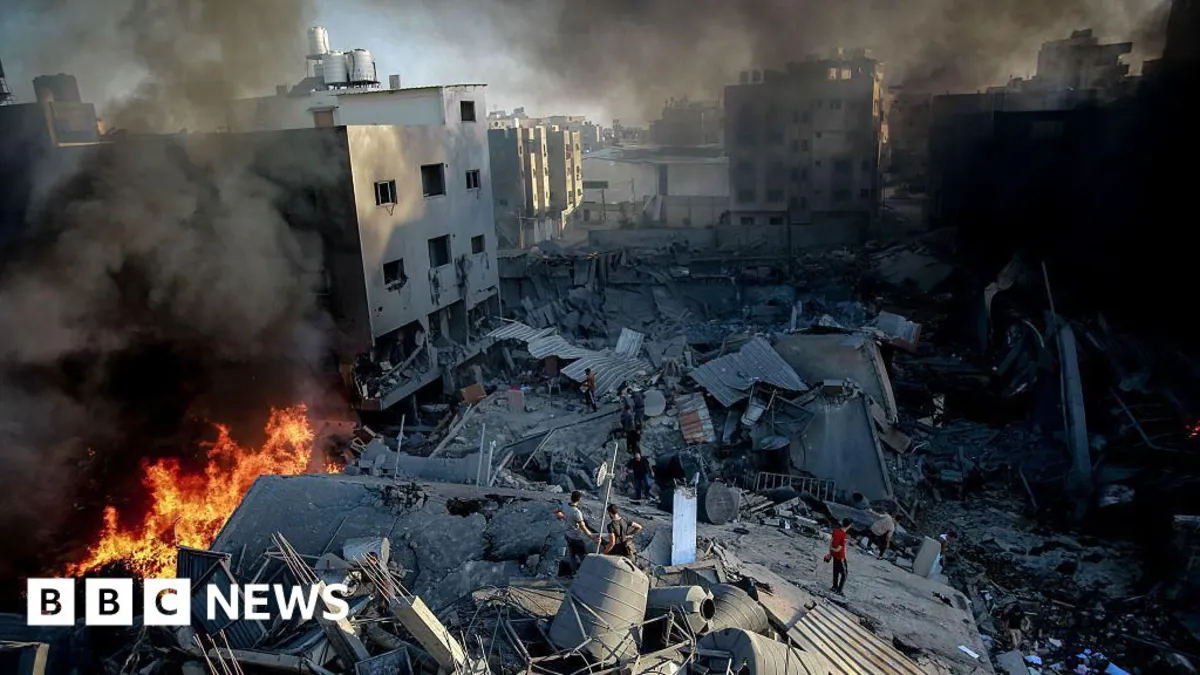
A senior Hamas figure has indicated to the BBC that the militant group is likely to reject Donald Trump's peace plan for Gaza, arguing that the proposal primarily serves Israeli interests while sidelining the needs of the Palestinian people. The official stated that Hamas would likely refuse to disarm and relinquish their weapons—one of the key conditions outlined in Trump's plan.
In addition to disarmament, Hamas is reportedly opposed to the deployment of an International Stabilisation Force (ISF) in Gaza, perceiving it as a new form of occupation. This perspective raises concerns about the implications of foreign military presence in the region, further complicating the peace process. In contrast, Israeli Prime Minister Benjamin Netanyahu has expressed his acceptance of Trump's framework during discussions at the White House.
Hamas has not yet released an official statement regarding the plan, although discussions are ongoing and expected to last several days. These talks include other Palestinian factions, emphasizing the diverse perspectives within the Palestinian community. The Palestinian Islamic Jihad (PIJ), which played a role in the October 7 attack and previously held Israeli hostages, has already rejected the plan, citing similar concerns.
A significant point of contention for Hamas is the requirement to release all hostages in a single transaction, effectively relinquishing their primary bargaining chip. Despite Trump’s backing, there remains a lack of trust that Israel would not resume military operations following the hostages' release. This skepticism is heightened by Israel's recent attempts to target Hamas leadership in Doha, which occurred despite U.S. diplomatic efforts.
Moreover, a map shared by the Trump administration suggests a proposed buffer zone along Gaza's southern border with Egypt. The details surrounding the administration of this buffer zone remain unclear, but the involvement of Israel could lead to further disputes.
Since agreeing to the plan, Netanyahu has seemingly retracted some of its terms. In a video posted on X, he affirmed that the Israeli military would maintain a presence in parts of Gaza and emphasized that Israel would resist the establishment of a Palestinian state. This stance contradicts the provisions of Trump's framework, which calls for a complete withdrawal of Israeli forces and posits a potential pathway to Palestinian self-determination and statehood.
Within Gaza, sentiments towards the plan are mixed. Many Palestinians support the proposal primarily because they believe it could lead to an end to the ongoing conflict. Resident Khadar Abu Kweik shared his views with the BBC, stating, "The American plan has bad clauses, but I support it because it will stop the war and get rid of Hamas." His remarks reflect a desperation for peace, even if it comes from a plan that may not align with their aspirations.
Palestinian journalist Fathi Sabah expressed serious concerns about a potential rejection of the plan by Hamas. He warned that such a decision could provide Netanyahu with a "green light" to escalate military operations, backed by American and Western support, which would further devastate Gaza. Sabah articulated the dire situation faced by the people of Gaza: "They are devastated, exhausted, desperate and hopeless. They want a ceasefire now, not tomorrow, at any cost, even though they know the plan serves Netanyahu's interests."
The Israeli military's campaign in Gaza began in response to the Hamas-led attack on southern Israel on October 7, 2023, which resulted in approximately 1,200 casualties and 251 hostages. Since that time, the Hamas-run health ministry in Gaza has reported that at least 66,097 individuals have lost their lives due to Israeli attacks. The humanitarian crisis has escalated to alarming levels, with a UN-backed organization confirming that famine is occurring in Gaza City.
Earlier this month, a UN commission of inquiry determined that Israel had committed acts of genocide in Gaza, a claim that Israel has vehemently denied. As the situation continues to unfold, the future of peace in Gaza remains uncertain, with the voices of the Palestinian people growing increasingly urgent for immediate action.